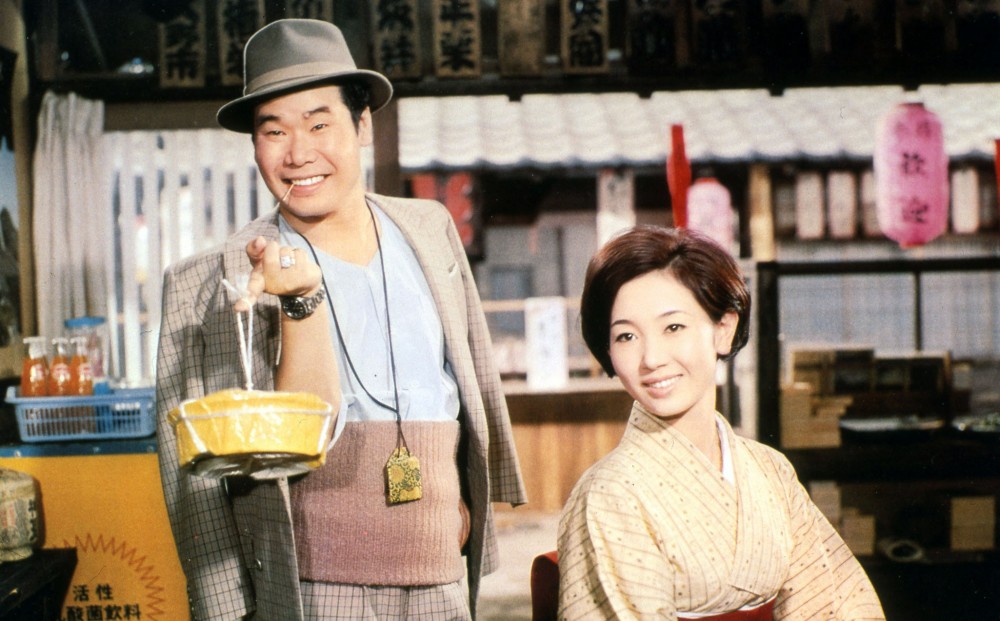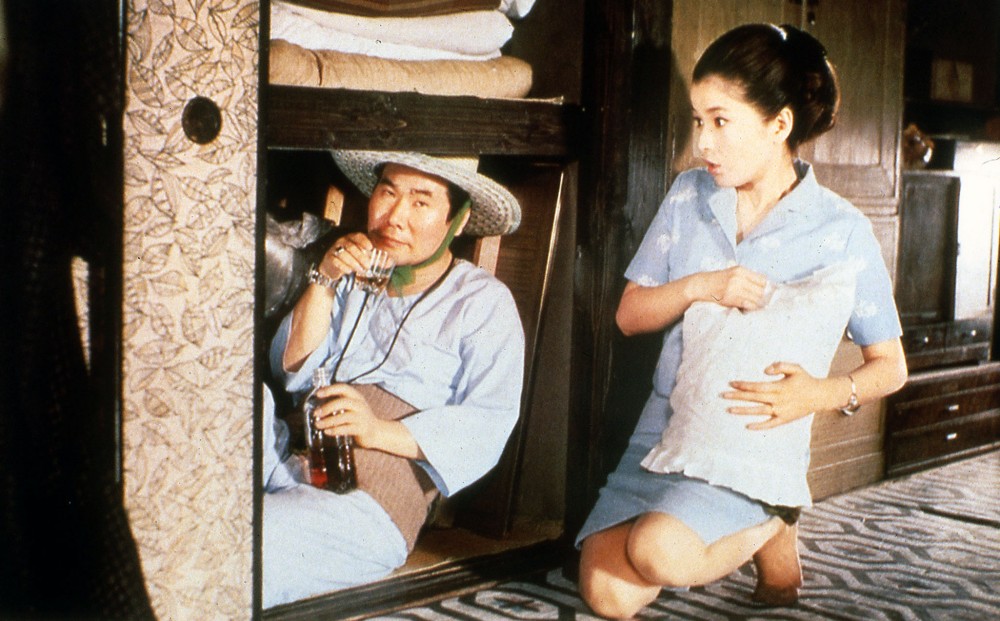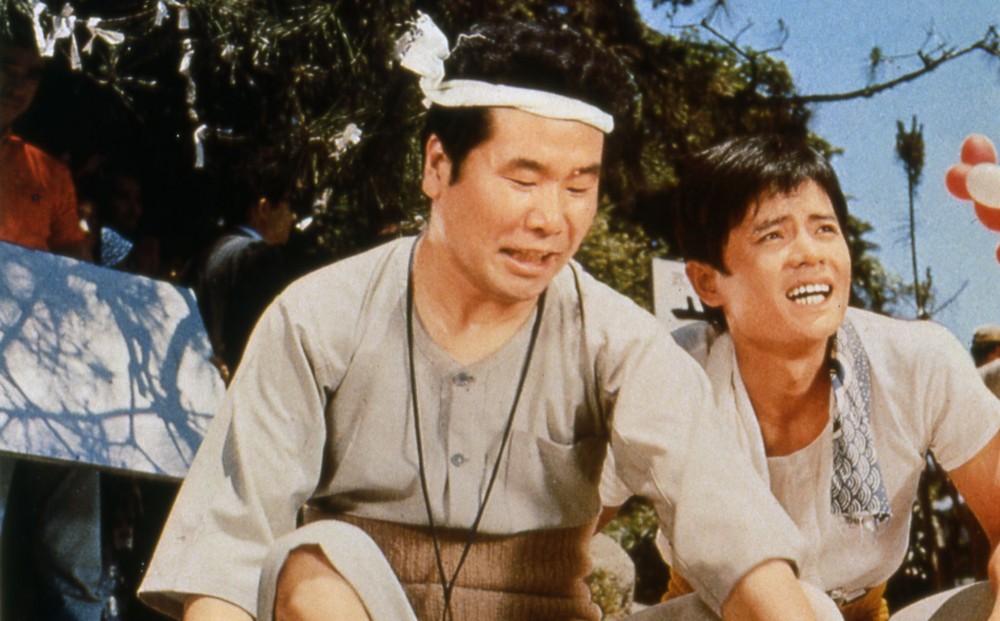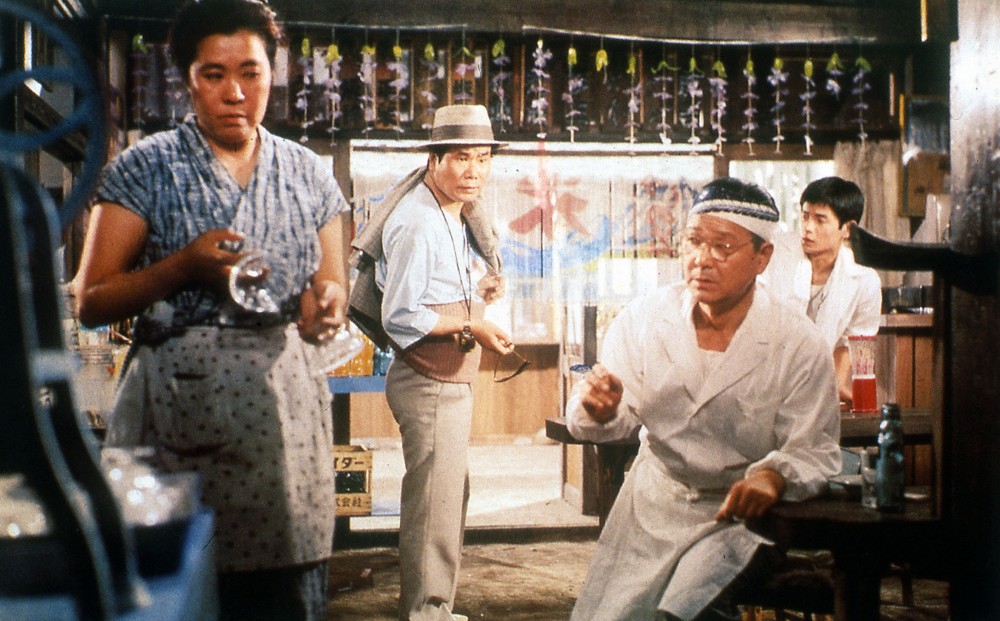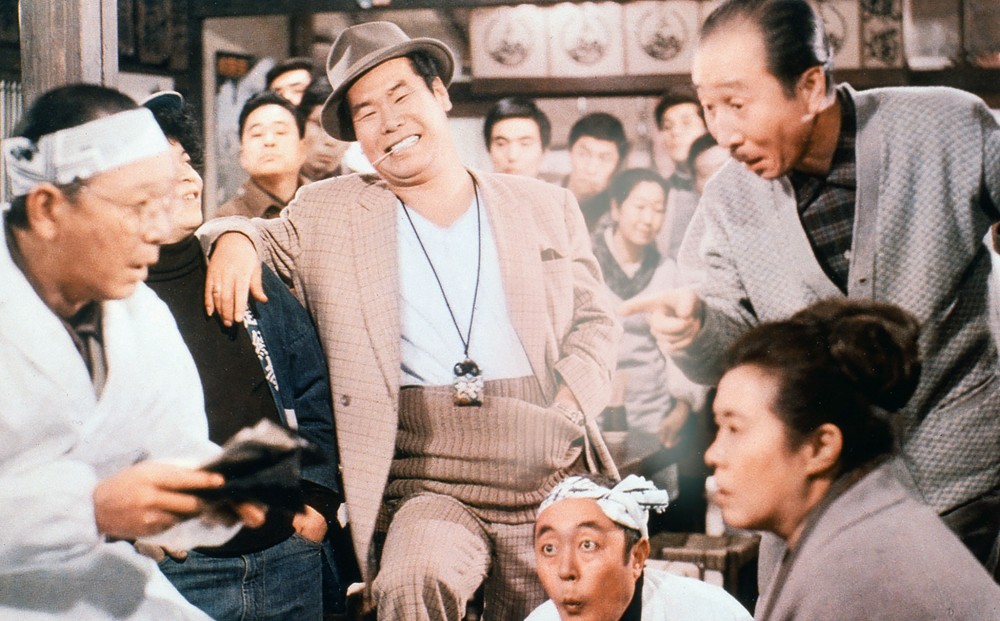Yôji Yamada’s
TORA-SAN, OUR LOVABLE TRAMP
(IT’S TOUGH BEING A MAN)
12:50 2:40 4:30 6:20 8:10
MUST END THURSDAY, OCTOBER 17
NEW 50th ANNIVERSARY 4K RESTORATION
(1969) Back after 20 years, Kiyoshi Atsumi’s itinerant, rough around the edges peddler Torajiro Kuruma (nicknamed Tora-san, literally “Mr. Tiger”) returns to his aunt and uncle’s sweet shop in Shibamata (a real Tokyo neighborhood, now a tourist destination thanks to Tora-san), just in time to vulgarly, scatalogically, but hilariously botch the o-miai (formal prospective couples meeting) of his kid sister Sakura (Chieko Baishô); but later reverse-psychologizes two timid lovers into a real romance.
Celebrating the 50th anniversary of this, the first of a legendary comedy series — per Guinness, the longest starring the same actor (48 Scope features over 26 years) – all but two directed by Yamada, and all starring Atsumi and an enduring cast of supporting characters.
Tora-san, Our Lovable Tramp (It’s Tough Being a Man) and its sequels proved so popular that producing company Shochiku began releasing two Tora-san comedies a year: one for the obon season (beginning in mid-August) and the other for the shogatsu season (New Year’s). The series ended with the death of the beloved Atsumi in 1996; Japan had a period of mourning for the actor, who was considered a family member for many Japanese.
In Japan, Atsumi’s Tora-san is as iconic as Charlie Chaplin: that square face, that so-square-it’s-almost-hip hat; that here-comes-trouble grin; a sometimes naïve, sometimes bumptious bull in a china shop; but who can cut the wise guys down to size, cut through pretentious piffle, and provide serene counsel to the troubled and the lovelorn — if not always to himself. Though the character was softened over the years to belie his yakuza-like origins (in each ensuing film, he’d become infatuated with a new “Madonna,” a young woman romantic interest, only to find his love unrequited by film’s end), Tora-san remains a Japanese national treasure.
The Tora-san series was brought into being by the famous duo of writer and director Yamada (born 1931) and star Atsumi (1928-1996). Yamada was deeply inspired by Atsumi’s recollections of the street vendors he looked up to in his youth, and was also impressed by his power of recall, engaging expressiveness, and skillful oratory. This led him to write a script for a TV show set in the old neighborhood of Shibamata, in Tokyo’s Katsushika City. Once it began airing, its popularity increased exponentially, and when Tora-san died in the final episode after being bitten by a pet viper, viewers voluminously voiced their dissatisfaction. As a result, production began on the first film adaptation, which opened on August 27, 1969 and grew into the 48-film series; a special “finale” was released in 1997, following Atsumi’s death.
Over the years, the enormously popular Tora-san films featured such guest stars as Toshirô Mifune, Machiko Kyô (Rashomon), Ayako Wakao (Ozu’s Floating Weeds), even New York-born Herb Edelman (one of the poker players from Neil Simon’s The Odd Couple, in both the movie and on Broadway). Most of the supporting cast remained with the series for the entire 26-year run, including Chieko Baishô as Tora-san’s little sister, Gin Maeda as her husband, Chieko Masaki as Tora-san’s aunt, and Chishû Ryû (the father from Ozu’s Tokyo Story) as the local Buddhist priest.
To celebrate the 50th anniversary, Yôji Yamada (who turned 88 this past September 13) has directed Welcome Back, Tora-san, to be released in Japan in December for shogatsu season. Marking the 50th entry in the series, it stars two of the actors from the original films (Chieko Baishô and Gin Maeda), along with archival footage of Atsumi as Tora-san.
Three other new Tora-san restorations will be screened in the next few months at Japan Society: Tora-san’s Dear Old Home, ninth film in the series (screening October 4), Tora-san’s Runaway, the fifth (November 1), and Tora-san Meets His Lordship, the nineteenth (December 8).
Following its one-week run of Tora-san, Our Lovable Tramp (It’s Tough Being a Man), Film Forum will present SHITAMACHI: TALES OF DOWNTOWN TOKYO, a 3-week, 25-film series spanning nearly eight decades of classic Japanese cinema, including films by Ozu, Kurosawa, Mizoguchi, Naruse, Yamada, Imamura, Kitano, Kore-eda, and many others. The Shitamachi festival is a co-presentation of The Japan Foundation, as part of the citywide Japan 2019 festival.
DCP. Approx. 91 min.
Photos: TORA-SAN, OUR LOVABLE TRAMP (IT’S TOUGH BEING A MAN) © Shochiku Co., Ltd.
A Shochiku Release
Four additional new Tora-san restorations will screen at Japan Society from September to December. See japansociety.org for further information.
Read more about Tora-san’s legacy as the hero of Japan’s longest running movie series.
Reviews
“…a little Chaplin, a little Jerry Lewis, a little Red Skelton…”
– Roger Ebert on Tora-san

